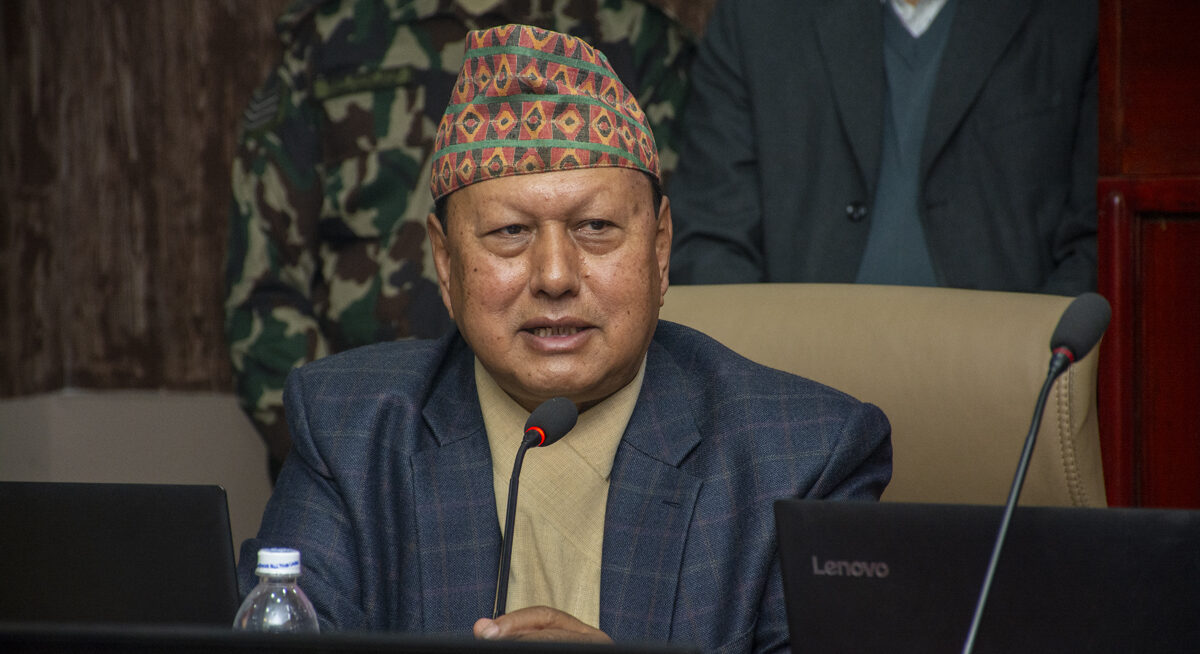0%

Mohan Basnet, Minister of Health and Population speaking in a program at Pavilion Hall, Durbar Marg, Kathmandu on Thursday/Photo: Khabarhub
KATHMANDU: The government is set to lift the ban on nursing colleges lacking a dedicated 100-bed hospital, allowing them to resume nursing classes.
Simultaneously, there are preparations underway to amend the Medical Education Act with the goal of attracting foreign students to Nepal.
Under the current provisions of the Medical Education Act, educational institutions without the capability to run a 100-bed hospital were prohibited from offering nursing programs.
This decision resulted in the closure of approximately 78 nursing colleges affiliated with CTEVT.
Criticism from medical entrepreneurs, such as Durga Prasai, has focused on the hardship faced by many students who were forced to seek nursing education abroad due to the closure of non-compliant colleges.
In response to these concerns, the government is now inclined to relax the stringent standards imposed on nursing education and officially lift the ban.
Speaking to Khabarhub after launching of Joy Nepal, an online news portal dedicated to women, health issues and lifestyle at the Pavilion Hall, Durbar Marg in Kathmandu on Thursday, Health Minister Mohan Basnet emphasized that this adjustment does not necessitate parliamentary approval; rather, it can be executed through cabinet decisions, a process currently in motion within the Ministry of Education.
Minister Basnet elaborated, stating, “To facilitate the reopening of nursing education, parliamentary amendments are unnecessary; the cabinet has the authority to enact these changes. However, we have requested the establishment of a framework to assess quality and set fees as part of this reform.”
Meanwhile, in response to the rising trend of Nepali students seeking medical education abroad, the government is gearing up to amend the Medical Education Act.
The objective is to address the challenges faced by students and create opportunities for them within the country, Minister Basnet said.
The proposed amendments involve allowing the teaching of nursing and paramedics in government hospitals equipped with 100 to 300 beds.
Additionally, the government aims to extend MBBS education to hospitals with more than 300 beds.
Health Minister Basnet also highlighted that implementing these changes will enable students to pursue MBBS in the existing zonal hospitals across all seven provinces.
Minister Basnet emphasized the economic implications of retaining medical education within the country, stating, “Billions of rupees are currently leaving our country. By taking the lead in medical education, we can retain this capital, create jobs, and reduce the number of students migrating abroad.”
He pointed out the opportunity to attract students from India, where millions apply for MBBS annually.
Minister Basnet also envisioned bringing a fraction of these students to Nepal, resulting in a significant influx of funds into the country.
However, he noted that the current Medical Education Act restricts such possibilities.
Minister Basnet further expressed enthusiasm about the potential for South Asian students to come to Nepal for medical education, contributing substantially to the country’s economy.
He underscored the impact of the existing scenario, where numerous students with high academic achievements face barriers in pursuing nursing and medical education.
Highlighting the mental health repercussions, Minister Basnet mentioned the alarming rise in depression in Nepal, attributing a significant portion of it to educational and health-related frustrations.
He asserts the need for transformative measures, emphasizing the importance of instilling hope and effecting positive change in education and healthcare to curb the increasing despair in society.